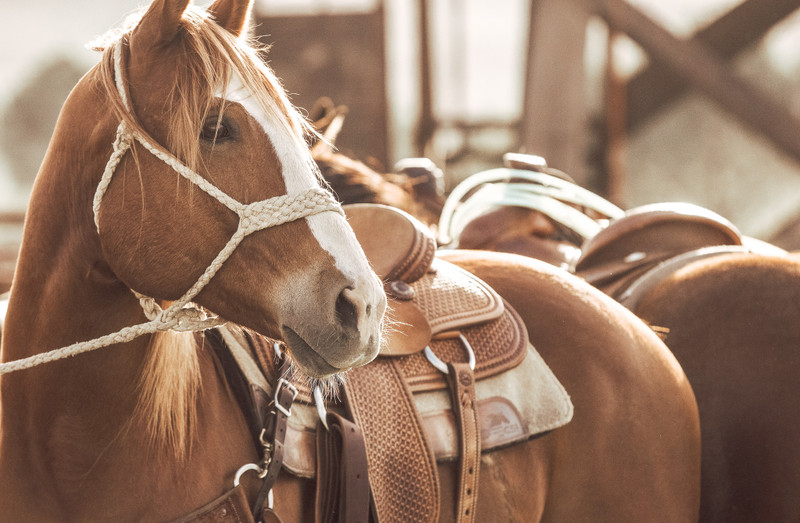Colic is a general term that refers to abdominal pain in horses and is one of the most widely recognized ailments in the industry. Throughout the years it has been a broad term for a variety of conditions that cause a horse to exhibit signs of abdominal discomfort. Signs of colic can range from mild to severe, and some episodes can be life threatening.
Signs of Colic:
- Looking at their sides frequently
- Biting or kicking at abdomen
- Rolling or attempting to roll
- Laying down
- Lack of appetite
- Minimal or no manure passing
- Diarrhea
- Pawing
- Stretching out
- Sweating or increased breathing rate
- Depression
Clinical signs depend on the cause of the colic and personality of the horse. Mild, recently onset symptoms may improve by walking the horse. However, if the length of time showing symptoms is unknown, vitals are not normal, and/or symptoms do not improve with walking, a horse should be examined by a veterinarian immediately. Delay in treatment can decrease the prognosis of survival.
Diagnosis & Treatment
There are many different types of colic your horse may experience ranging from impaction (buildup of material such as sand or feed in the gut making it difficult to pass) to gas colic (excessive gas and bloating), or strangulation or twisted gut colic which can be life threatening. Diagnosis of colic will typically start with a physical exam and evaluation of the horse’s history and may lead to other exams based on initial findings.
Treatment varies depending on severity, but typically consists of banamine or sedation administered by a veterinarian. Along with possible laxatives such as mineral oil to help stimulate gut motility or water for rehydration, both of which are administered through a nasogastric tube. Surgical treatment may be considered if the horse remains uncomfortable or if specific indicators are found during exam that indicate a surgical problem. Each colic case is unique and it is important to work with your veterinarian to determine the best plan for your horse.
How Modern Day Care has Influenced Gastric Upset
Because colic is so common and can be unpredictable, it is often thought as colic to be unpreventable. While this does ring true for some cases, it is also important to recognize that colic is much more of an issue in today’s horses due to modern day practices in feeding and caring for horses.
The horse is intended to be a grazer; eating small amounts throughout day to meet their energy requirements through forage. This is why the horse’s stomach is constantly producing gastric acid. Over the years, humans have created an environment that no longer mimics a horse’s original, natural state in the wild. Humans have harvested their forages to optimize nutrition, provide mixed grains for energy-dense meals, restricted grazing time and introduced larger, scheduled meals. Along with the confinement in stalls and paddocks, increased training, competition, and so forth. Through these actions we have made domestic horses more susceptible gastric upset, pH changes, and imbalances in the microbial population that can lead to digestive upset or colic.
Luckily as horse owners, there are things we can do to help reduce the risk of colic through management practices and improving digestive health.
8 Steps to Reduce Colic Risk
Gradual Changes
Colic risk increases within two weeks following changes in diet, housing, and/or exercise. One of the most common associations with colic is a change in their feed or forage, including hay. Try making changes gradually, over the course of a week at minimum. In instances where gradual change is not possible, a gastric support supplement can help make those transitions easier on your horse’s digestive system.
Mimic Grazing
The horse was originally intended to graze, but in more modern-day habits, many horses are given two large meals per day, which can be a recipe for disaster to your horse’s digestive system. It is ideal to create a similar environment as natural intended. Free choice forage, through pasture or hay is ideal. However, if that is not an option, feed smaller but more frequent meals, which allows starches to digest before reaching the equine hindgut.
Forage First
Horse’s intestinal tracts are not made to digest grain. High-grain diets are linked to increased incidence of colic, as well as many other disorders. While there are some cases grain may be necessary, it is always best to keep levels to a minimum and split between multiple feedings per day.
Avoid Feeding in Sand
Use feed tubs or hay racks if your horses reside on a sandy soil and have a firm surface for scraps to fall. Overgrazed pastures can also cause increase sand consumption. Horses may accidentally ingest enough sand to interfere with their gut, this can build up in the digestive track overtime causing loose stool or putting them at risk for sand colic. Horses that live in a sandy environment or have a history of sand colic may benefit from a preemptive measures like the use of psyllium, such as MVP’s Sand-Free™.
Fresh Water is a Must
Dehydration can be another risk factor, in fact research shows horses without water for one to two hours had an increased risk of colic. This risk increased 10 times in horses over 6 years of age. When stalling, dumping out buckets and filling with fresh, clean water a few times a day can make a big difference. Horses will drink more in cooler weather if the water is warm. When traveling, stop to offer your horses a drink. Electrolytes or salt can also be used to stimulate thirst and help prevent dehydration.
Increase Pasture Turnout
Increased stalling or limited turnout can also raise your horse’s colic risk. Turnout and/or daily exercise is beneficial for horses in numerous ways. In instances where a horse is unable to receive activity through turnout or exercise, make sure other risk factors are evaluated. Consider free choice hay, increasing water consumption, and/or limiting grain.
Maintain Health Management
Horses on a daily or regular worming program are less likely to colic. Heavy parasite loads may cause intestinal inflammation, increasing their risk for GI disturbances. Routine teeth floating ensures your horse chews its feedstuff properly and thoroughly.
Provide Additional Digestive Support through a Gastric Supplement
A gastric health supplement helps allow the body, specifically the digestive tract to better manage stress, changes in your horse’s diet or environment, and fluctuations in the pH and microbial population within the gut. As a result, this helps the stomach to face changes more smoothly with a lesser concern of digestive issues, including colic.

